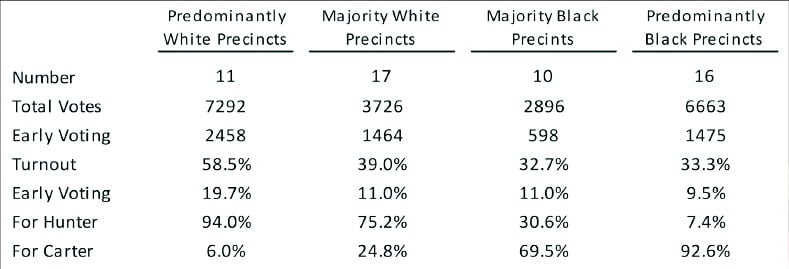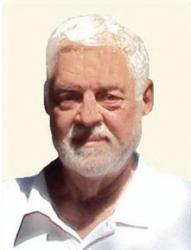When residents of Lake Charles went to the polls to choose a new mayor, two candidates were on the ballot: Nic Hunter, a businessman and police juror, and Wilford Carter, a former judge and state representative. Whichever candidate was elected it would be an historic event: Hunter would be the first Republican elected mayor of Lake Charles and Carter would be the city’s first black mayor.

Hunter won the election in voting that appears to have been largely along racial lines. This perception is unfortunate. The current mayor, Randy Roach, held the office for 17 years and did a great job of promoting unity in a city that is roughly equally divided between white (43.8 percent) and black (47.7 percent) residents, with 8.5 percent listed as “other.”
But was race as large a factor in the election as it looks on paper? Let’s analyze the voting according to four types of precincts: predominantly white (85 percent or more), majority white, majority black and predominantly black (85 percent or more).
At first glance, the results show a strong racial preference for the two candidates. But that does not necessarily mean that race was the deciding factor. You can take just about any election and find the Democrat candidate — black or white — receiving 90-plus percent of the votes in the predominantly black districts. That’s simply because blacks are predominantly Democrats.
Voter turnout can be more telling than the percentage of the vote a candidate receives. For example, black voter turnout tends to be lower than white voter turnout. But when President Obama was on the ballot, black voter turnout soared.
Wilford Carter enjoyed no such boost, which suggests that most blacks were not in a rush to go to the polls to elect someone simply because he would be the first black mayor of Lake Charles.
On the other hand, voter turnout was extremely high in predominantly white precincts — to the benefit of Nic Hunter. Many white voters were strongly opposed to Wilford Carter. But was that opposition motivated by his race? Justly or unjustly, Carter has suffered from some negative publicity in the past.
One cannot judge racial motivation by looking at party affiliation because Republicans almost always vote for the Republican candidate when they have the opportunity. And in this mayoral race, there was a Republican on the ballot.
What is more telling may be how white Democrats voted, because they are people who voted for President Obama and other black candidates in the past. It appears many of them voted for Hunter, although one cannot tell for sure just by looking at vote totals.
One factor that stands out in this election is the early voting. The early vote went two-to-one for Nic Hunter. And early voting was twice as prevalent in predominantly white districts as in predominantly black districts.
But again, was this due to race? The Republicans were extremely active on social media and Hunter worked very hard at getting out the vote. Perhaps hard work and modern technology pay off when one is running for public office.
I’m not dismissing race as a factor in the mayoral election. But I am suggesting that one can read too much racial division into the election when one just looks at the raw data. I’ve had many white voters tell me they would have been very willing to vote for several of the black candidates who didn’t make it into the runoff election. Similarly, many black voters have demonstrated in the past their willingness to vote for a white candidate.
What is important as Lake Charles moves forward is that the new mayor follows the lead of Randy Roach in building unity in our community. Lake Charles will not prosper if it is a city divided against itself.















Comments are closed.